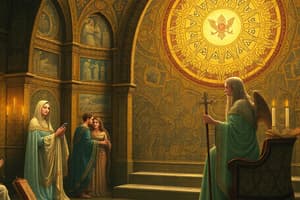Podcast
Questions and Answers
What is the main argument behind St. Thomas Aquinas' First Way of proving the existence of God?
What is the main argument behind St. Thomas Aquinas' First Way of proving the existence of God?
- The possibility of contingent beings
- The gradations of perfections among beings
- The evidence of motion and the concept of infinite regress (correct)
- The notion of efficient cause
What is the consequence of an infinite series of movers in St. Thomas' First Way?
What is the consequence of an infinite series of movers in St. Thomas' First Way?
- The existence of God would be disproven
- There would be no need for a First Mover
- The concept of infinite regress would be proven
- Motion would never have started and there would be no motion now (correct)
What is the main idea behind St. Thomas' Second Way of proving the existence of God?
What is the main idea behind St. Thomas' Second Way of proving the existence of God?
- The concept of infinite regress in motion
- The gradations of perfections among beings and their source
- The possibility of contingent beings and their existence
- The notion of an efficient cause and the impossibility of self-causation (correct)
Why cannot a being be the efficient cause of itself according to St. Thomas' Second Way?
Why cannot a being be the efficient cause of itself according to St. Thomas' Second Way?
What is the main idea behind St. Thomas' Third Way of proving the existence of God?
What is the main idea behind St. Thomas' Third Way of proving the existence of God?
What is the implication of the existence of contingent beings according to St. Thomas' Third Way?
What is the implication of the existence of contingent beings according to St. Thomas' Third Way?
What is the main idea behind St. Thomas' Fourth Way of proving the existence of God?
What is the main idea behind St. Thomas' Fourth Way of proving the existence of God?
What is the significance of the concept of 'First Mover' in St. Thomas' First Way?
What is the significance of the concept of 'First Mover' in St. Thomas' First Way?
What is the underlying assumption of the fourth way?
What is the underlying assumption of the fourth way?
According to the fifth way, how do natural bodies achieve their end?
According to the fifth way, how do natural bodies achieve their end?
What is the conclusion of the fifth way?
What is the conclusion of the fifth way?
What is the relationship between the perfect being and less than perfect beings?
What is the relationship between the perfect being and less than perfect beings?
What is the analogy used in the fifth way to explain direction towards an end?
What is the analogy used in the fifth way to explain direction towards an end?
What is the name given to the intelligent being who directs natural bodies to their end?
What is the name given to the intelligent being who directs natural bodies to their end?
Flashcards are hidden until you start studying
Study Notes
St. Thomas Aquinas' Five Ways to Prove the Existence of God
First Way: Motion
- Motion is evident all around us
- Whatever is in motion now was at rest until moved by something else
- There cannot be an infinite series of movers (infinite regress) as it would mean no motion could have started
- Therefore, there must be a First Mover which is itself unmoved, referred to as God
Second Way: Efficient Cause
- Efficient causes are producing causes in the world
- Nothing can be the efficient cause of itself, as it would require being prior to itself
- There cannot be an infinite regress of essentially related efficient causes, as there would be no causality in the series
- Therefore, there must be a first un-caused efficient cause of all efficient causality in the world, referred to as God
Third Way: Possibility and Necessity
- Every existing being does not owe its existence to itself
- Beings that begin to exist and cease to exist are contingent beings
- Not all beings can be possible beings, as what comes to exist does so only through what already exists
- Therefore, there must be a necessary being that exists, referred to as God
Fourth Way: Degrees of Perfection
- There exist gradations of perfections among beings
- Things cannot be more or less perfect unless there is a wholly perfect being
- The wholly perfect being is the cause of the less than perfect beings
- Therefore, there must be a perfect Being which is the cause of perfections of the less than perfect beings, referred to as God
Fifth Way: Degrees of Perfection
- The behavior of natural things in the world implies a Grand Designer or Architect
- Natural bodies act for an end, achieving their end not by chance, but by design
- Whatever lacks knowledge cannot move towards an end unless directed by a being endowed with knowledge and intelligence
- Therefore, some intelligent being exists, referred to as God, by whom all natural things are ordered to their end
Studying That Suits You
Use AI to generate personalized quizzes and flashcards to suit your learning preferences.




